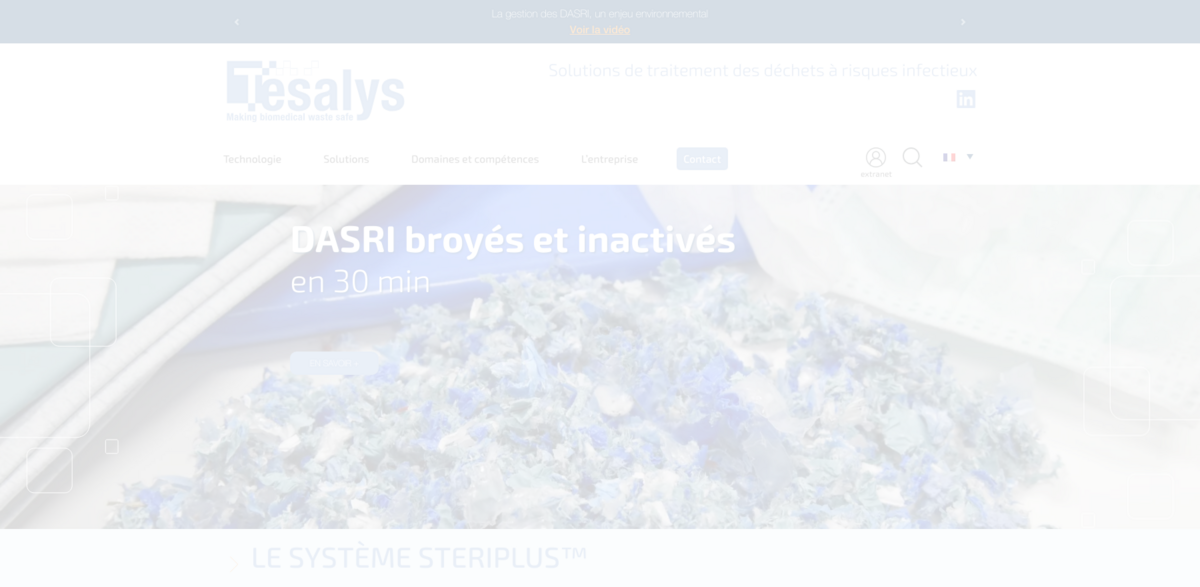What the project is
Solutions for the Treatment of Infectious Waste addresses one of today’s most sensitive environmental challenges – the management of infectious risk waste (DASRI). With more than 10 years of proven expertise, this innovative project offers a state-of-the-art approach to the treatment of infectious waste directly at the site where it is generated. Informed by scientific research and built on Technology Made in France, the project provides on-site treatment solutions that transform hazardous biomedical waste into a form comparable to household waste. It leverages the STERIPLUS™ system – a pre-treatment device that combines a sterilizer (autoclave) with an integrated shredder – ensuring that waste is shredded and inactivated in just 30 minutes. This unique design not only boosts operational efficiency but also addresses public health and environmental concerns simultaneously … making it, in every sense, a breakthrough in waste management.
Main Benefit
The benefits of this system are impressive in both performance and environmental impact. Key figures and facts include:
- On-site treatment: A compact, ergonomic design that makes it easy to deploy and use directly next to the waste generation site.
- Scientifically tested: Decontamination technology based on steam sterilization at 135°C has been rigorously proven – with microbiological efficacy certified by independent organizations.
- A plus for the environment: An effective alternative to incineration that reduces CO2 emissions, while cutting down waste volume by an impressive 65% to 80%.
Advanced On-Site Treatment
At the heart of the project lies the STERIPLUS™ system, a device that ensures complete safety throughout the decontamination cycle. By integrating both shredding and steam autoclaving in a closed unit, it reduces contamination by 6 log10 (or even 8 log10 for bacterial spores) and mechanically transforms waste into small, unidentifiable pieces (8-10 mm). This all-in-one solution means that infectious risk waste can be treated immediately on-site, eliminating many of the risks related to storage, transport, and eventual disposal. It is a system crafted to work seamlessly in high-demand environments such as hospitals, clinics, laboratories, and even during epidemic episodes like Covid-19 and Ebola.
Targeted Application Areas
The system is designed with various settings in mind – from hospitals and clinics that need to establish clear treatment pathways for diverse waste streams, to medical centers where the focus is on minimizing risk, small dialysis centers managing moderate quantities of hazardous waste, and laboratories where the presence of pathogenic elements demands stringent controls. Moreover, its application extends into epidemic risk management, ensuring that during crisis moments, the equipment stands as a safeguard against the uncontrolled spread of infections. The design is perfectly suited for facilities in need of a compact and reliable treatment alternative that supports both public health and environmental protection.
Proven Efficacy and Performance
Effectiveness is not just a claim – it is proven in multiple ways. The STERIPLUS™ system undergoes microbiological testing that demonstrates a significant reduction of up to 8 log10 during its decontamination cycle, with non-recontamination verified after 28 days of incubation. Beyond microbiological efficacy, the system achieves physical transformation of waste, shredding materials into uniform pieces of 8-10 mm, which results in a reduction of solid waste volume by up to 80% and weight by up to 50%. The design also extends care to air and liquid waste – outgoing air is processed through a microbiological filter while liquid effluents are treated at 135°C before discharge. This holistic approach to waste management ensures that the process remains safe for both the operator and the surrounding environment.
Environmental and Public Health Impact
- SDG 3: Good Health and Well-Being – By mitigating the risks posed by infectious waste, the system enhances public health safety.
- SDG 9: Industry, Innovation and Infrastructure – The project represents an innovative application of advanced technology, underlining European industrial expertise.
- SDG 11: Sustainable Cities and Communities – The on-site treatment minimizes transportation needs and reduces the burden on municipal waste management systems.
- SDG 12: Responsible Consumption and Production – By offering an environmentally friendly alternative to incineration, the treatment contributes significantly to sustainable waste management practices.
- SDG 13: Climate Action – The reduction of CO2 emissions and the minimized waste volume pave the way towards a lower carbon footprint.
Future Outlook
This solution is not only an answer to the current challenges in biomedical waste management – it is a template for future systems designed to address environmental and public health emergencies. With a focus on state-of-the-art biohazardous waste treatment and built close to the source of production, the STERIPLUS™ system, developed in the vibrant industrial landscape of Toulouse, is set to expand internationally. The fusion of advanced technology with sound public health measures demonstrates that applied innovation can lead to significant improvements in environmental risk management and a reduction in overall carbon footprint. The project’s success serves as a testament to how groundbreaking treatment solutions, combined with a clear operational focus, can lead to smarter, safer, and more sustainable waste management practices … ensuring that critical infectious waste is controlled in the best possible way.






















